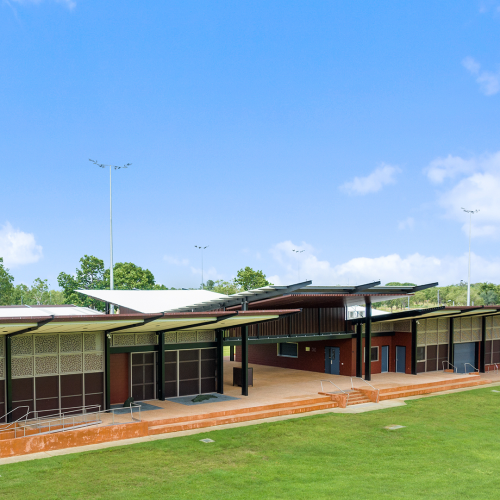Fleurieu Regional Aquatic Centre
- Client:
- City of Victor and Alexandria Council
- Location:
- Victor Harbor, South Australia
- Project Website:
- Visit the project's website
Hames Sharley, in collaboration with DWP Suters, was the lead consultant leading a multi-discipline team for the development of a regional aquatic and recreation facility for the Southern Fleurieu Peninsula in South Australia. The indoor aquatic centre contains health, sport and recreation facilities for the growing communities from Victor Harbor to Goolwa and further afield. The aquatic centre is located on the south-eastern corner of the intersection of Waterport and Ocean Roads at Hayborough, South Australia.
The Fleurieu Regional Aquatic Centre provides the community with a modern sport and recreation facility with an eight-lane, 25-metre lap swimming pool and a multiuse rehabilitation, leisure and children’s pool. It also includes a crèche facility, a fitness room and a commercial kiosk incorporating feature deck with views to wetland and open space surrounds. An office accommodation for facility management, first aid and lifeguard rooms and dedicated change rooms and toilet facilities are also included.
It is a contemporary building which responds to the local topography and is reflective of the cultural significance of local indigenous heritage. Victor Harbor is a low density, a friendly seaside area with a rapidly growing population. The centre provides a new community focus for recreation, fitness and leisure through its eight-lane 25 metre lap swimming pool, warm water rehabilitation pool, leisure and learn-to-swim pool, outdoor splash pad with adjacent family focussed BBQ and picnic areas and its fitness facility.
As a family-friendly centre, it facilitates social opportunities with the inclusion of a creche and commercial kiosk with adjoining feature deck offering generous views to local wetlands and surrounds.
Managing a range of complex stakeholder interests was the key to the success of the project, has been a joint venture between the City of Victor Harbor and Alexandrina Council, supported by Federal and State Government funding. The project not only represents a significant financial investment by local Councils, pleasantly being delivered under budget and on time but also in the health and wellbeing of this regional community. The development enhances the two Council’s recreational services infrastructure by providing an appealing, all-weather leisure and health destination.
The concept for Fleurieu Aquatic Centre is inspired by the local indigenous story of Kondili the whale. In this story, four friends are attacked and retreat to the sea to become four sea creatures. This is manifested in the pool by way of four key spaces (pool hall, warm water pool, community facilities / multipurpose and administration/services spine) representing each of the creatures. This concept reflects integrated design thinking reinforcing a key sustainability feature of the project, that the built building must be “of its place” or genius loci. Through a holistic design response, this has meant that local materials and skills were sought, (hence the use of local earth for the rammed earth walls) and that the design responds to its specific climate conditions and social and cultural needs.
The building has successfully responded to its specific social context through the employment of local trades and skills, via the decision to specify a premium product such as rammed earth when other imported products could have sufficed; and secondly the methodological practice of being inherently “of the area” with local focus groups having been involved in numerous consultation sessions such that they were offered the opportunity to be included in the design process as an expert group.
Significant time was spent during design in assessing the local climatic conditions to establish the optimum building siting, orientation and massing. In fact, this project was heavily focused on collaboration, with not only two architectural practices successfully collaborating on design but also the involvement of the diverse sub-consultant team from the early concept phase, and the bi-partisan relationship of two Regional Councils. The project is focused on providing for visitors of all ages and abilities, including extensive hoist facilities to assist mobility challenged patrons on entering the pool.










